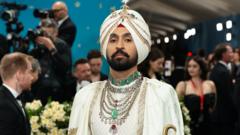A comprehensive study on what it takes to win Eurovision reveals the importance of personal themes, memorable performances, and distinctiveness in music, while recommending avoiding certain clichés like key changes.
Unraveling the Secrets to Eurovision Success

Unraveling the Secrets to Eurovision Success
Exploring the key elements that make a song a winner at the Eurovision Song Contest through analysis of past performances.
In the realm of international music competitions, the Eurovision Song Contest stands out as one of the most watched events globally. Winning at Eurovision is no simple task; it involves a blend of artistry, originality, and understanding what resonates with audiences and voters. A recent analysis has distilled the ethos of successful entries down to key themes and strategies that aspiring contestants can follow. Here are some crucial insights drawn from an examination of winners since the year 2000.
1. **Themes of Personal Liberation:** Many successful entries center around themes that inspire and resonate with audiences, such as the journey towards self-acceptance and liberation. For instance, Conchita Wurst's 2014 victory with "Rise Like a Phoenix" encapsulated this sentiment, offering a powerful narrative of triumph over adversity.
2. **Memorable Performances:** Ensuring that the stage performance is visually captivating is pivotal. Elaborate costumes, impressive choreography, and engaging stage setups contribute significantly to the overall impact of the song.
3. **Distinctive Musical Style:** Entries that stand out are usually those that introduce unique sounds or genres. A mix of various musical influences can help a song transcend traditional boundaries, capturing a diverse audience.
4. **Avoiding Clichés:** Among the advice for hopeful Eurovision participants is the recommendation to steer clear of conventional song elements, particularly key changes, which can sometimes detract from the song's flow and audience retention.
5. **Relatable Lyrics:** Lyrics that tell a story or convey emotional depth tend to resonate more deeply with listeners. Ensuring the lyrics speak to shared experiences can create a connection that translates into votes.
6. **Cultural Representation:** Songs that embrace and showcase cultural authenticity often capture the hearts of voters, as they celebrate diversity and inclusivity inherent in the Eurovision ethos.
7. **Instrumentation and Production:** A polished and well-produced track, featuring a blend of live and synthesized sounds, can enhance the listening experience and elevate the performance's overall professionalism.
As the Eurovision Song Contest continues to evolve, contestants can look to these fundamental elements as guiding principles in their artistic endeavors, inspiring a new generation of Euro pop stars poised to take the stage.
1. **Themes of Personal Liberation:** Many successful entries center around themes that inspire and resonate with audiences, such as the journey towards self-acceptance and liberation. For instance, Conchita Wurst's 2014 victory with "Rise Like a Phoenix" encapsulated this sentiment, offering a powerful narrative of triumph over adversity.
2. **Memorable Performances:** Ensuring that the stage performance is visually captivating is pivotal. Elaborate costumes, impressive choreography, and engaging stage setups contribute significantly to the overall impact of the song.
3. **Distinctive Musical Style:** Entries that stand out are usually those that introduce unique sounds or genres. A mix of various musical influences can help a song transcend traditional boundaries, capturing a diverse audience.
4. **Avoiding Clichés:** Among the advice for hopeful Eurovision participants is the recommendation to steer clear of conventional song elements, particularly key changes, which can sometimes detract from the song's flow and audience retention.
5. **Relatable Lyrics:** Lyrics that tell a story or convey emotional depth tend to resonate more deeply with listeners. Ensuring the lyrics speak to shared experiences can create a connection that translates into votes.
6. **Cultural Representation:** Songs that embrace and showcase cultural authenticity often capture the hearts of voters, as they celebrate diversity and inclusivity inherent in the Eurovision ethos.
7. **Instrumentation and Production:** A polished and well-produced track, featuring a blend of live and synthesized sounds, can enhance the listening experience and elevate the performance's overall professionalism.
As the Eurovision Song Contest continues to evolve, contestants can look to these fundamental elements as guiding principles in their artistic endeavors, inspiring a new generation of Euro pop stars poised to take the stage.





















